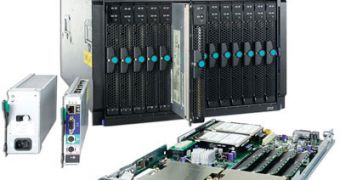The blade server industry is a very profitable one as the demand for more advanced configurations and servers featuring increased amounts of computing power is rising and HP, the world leader of computer hardware manufacturing companies, is positioned to make the best of this market trend.
HP was from the very beginning one of the strongest supporters of the blade server architecture as this setup lets clients expand already existing servers by simply adding more processing units, or blades (as they are commonly known). On the manufacturer side, the blade server architecture offers the distinct advantage that it is much easier to implement in ready to ship products than the traditional server architecture that asks for a standalone computing system. According to a HP press release, the company is currently leading the blade server market in both numbers of total blade systems shipped and factory generated revenues.
A market study published by the market research firm IDC revealed that HP increased its lead as the most important manufacturer and vendor of blade systems by 47.2 percent which translates into a year-over-year increase of more than 70 percent. The most sought after blade server systems were those from the HP BladeSystem c-Class and the ProLiant server architectures as the businesses require more powerful and scalable "computing solutions for traditional applications and new workloads such as Web 2.0, high-performance computing and gaming". On the x86 compatible server market, HP kept its leading position with a share of 34.8 percent while growing at a steady 18 percent pace in a year-over-year comparison. "HP's continued market leadership demonstrates we are successfully investing in areas critical for our customers' success," said Scott Stallard, senior vice president and general manager, Enterprise Storage and Servers, HP. "HP's innovation across our server and BladeSystem portfolios is driving customer preference that competitors cannot match and makes us a key technology partner for today's environments and those to come."
On the more flexible x86 compatible server market, thanks to its "highly competitive AMD Opteron processor-based server market segment", HP kept leading the competition as it shipped more than double the number of IBM servers. On the Itanium based server market, the HP line of products, the Integrity and the IntegrityNonStop, registered a 42.3 percent factory growth on a year-over-year during the second quarter of the 2007. The Linux running HP servers grew in shipments faster than the general market rate, reaching an increase of over 30 percent while gaining more than 6 percent of factory share in the second quarter of 2007, while on the Windows and Unix based server market, the company performed equally well registering the first position with 33.6 percent and 32.0 percent share, respectively.

 14 DAY TRIAL //
14 DAY TRIAL //